- Qualcomm Launches Snapdragon 4 Gen 2 Mobile Platform
- AMD Launches Ryzen PRO 7000 Series Mobile & Desktop Platform
- Intel Launches Sleek Single-Slot Arc Pro A60 Workstation Graphics Card
- NVIDIA Announces Latest Ada Lovelace Additions: GeForce RTX 4060 Ti & RTX 4060
- Maxon Redshift With AMD Radeon GPU Rendering Support Now Available
Ryzen For The Masses: A Look At AMD’s Ryzen 5 1600X & 1500X Processors
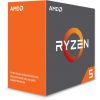
With our Ryzen 7 review, we found that AMD had released three powerhouse CPUs, chips able to do proper battle against the competition – and in many cases, win. Now, we have Ryzen 5. Will we see the same kind of bang-for-the-buck with these chips as we did with Ryzen 7? Obviously, there’s only one way to find out!
Page 7 – Linux: GeekBench, Blender, HandBrake & Phoronix Test Suite
(All of our tests are explained in detail on page 2.)
To wrap-up our performance results, we have a slew of Linux test results to pore over, which include two identical tests from the Windows suite (HandBrake and Blender).
The OS used in testing is Ubuntu 17.04, which is as out-of-the-box as we can make it. That means that the Nouveau driver is used for graphics (not that it should matter for CPU tests), and no unneeded software or services are installed. An exception: for the sake of improved AMD Ryzen support, the kernel has been upgraded to 4.10.1.
Most of our Linux testing is performed with the Phoronix Test Suite, which makes it ridiculously easy to benchmark a huge number of tests in one go, to let us, as Ronco famously said, “set it, and forget it!” Well, “forget it” until the next test needs to be run, anyway.
In addition to PTS, GeekBench is included for an overall performance look, while Blender and HandBrake are used for real-world testing.
GeekBench
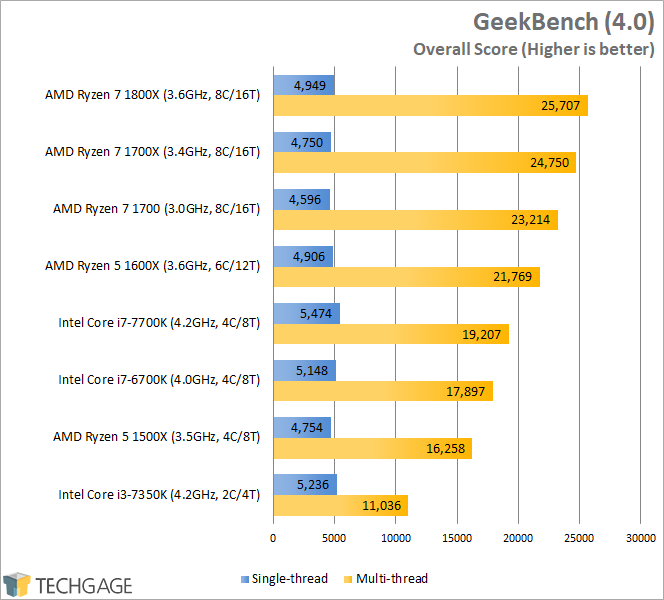
- AMD Ryzen 7 1500X
- AMD Ryzen 7 1600X
- AMD Ryzen 7 1700
- AMD Ryzen 7 1700X
- AMD Ryzen 7 1800X
- Intel Core i7-6700K
- Intel Core i3-7350K
- Intel Core i7-7700K
(Full results can be viewed at these links)
These results are great for showing the single-threaded performance between AMD’s and Intel’s processors, and to some degree the benefits of additional cores. The 1600X scores about 13% better than the 7700K on the multi-thread front, which isn’t surprising given its additional cores, but remains awesome due to a price tag that’s ~$80 lower.
In that 1600X vs. 7700K battle, we can see the gains of the six-core AMD chip over the four-core Intel one, and with the 1500X, the chip simply bleeds “bang-for-the-buck” given its $20 premium over the 7350K.
Blender & HandBrake
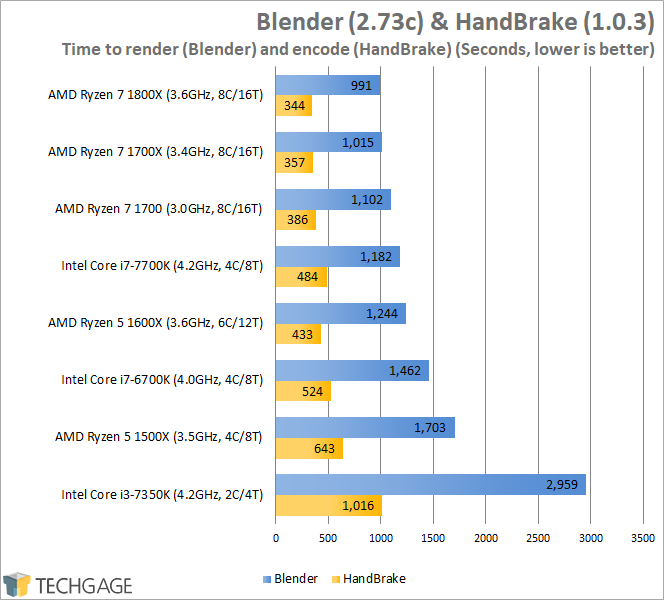
In both tests, the 1600X performs well against its Core i7 competition, and the same goes for the 1500X, which simply blows the $20 less expensive 7350K out of the water.
How do these Linux versions compare to their Windows counterparts?
| Blender (Windows) | Blender (Linux) | HandBrake (Windows) | HandBrake (Linux) | |
| AMD Ryzen 7 1800X | 991 s | 991 s | 333 s | 344 s |
| AMD Ryzen 7 1700X | 1055 s | 1015 s | 349 s | 357 s |
| AMD Ryzen 7 1700 | 1083 s | 1102 s | 378 s | 386 s |
| AMD Ryzen 7 1600X | 1250 s | 1244 s | 433 s | 433 s |
| AMD Ryzen 7 1500X | 1734 s | 1703 s | 660 s | 643 s |
| Intel Core i7-7700K | 1184 s | 1182 s | 495 s | 484 s |
| Intel Core i7-6700K | 1356 s | 1462 s | 542 s | 524 s |
| Intel Core i7-7350K | 2455 s | 2959 s | 1026 s | 1016 s |
That’s a hard question to answer, as we see benefits flip-flop. Overall, though, both the 1600X and 1500X perform very similarly between versions.
Phoronix Test Suite
(Additional results from our PTS testing can be found here.)
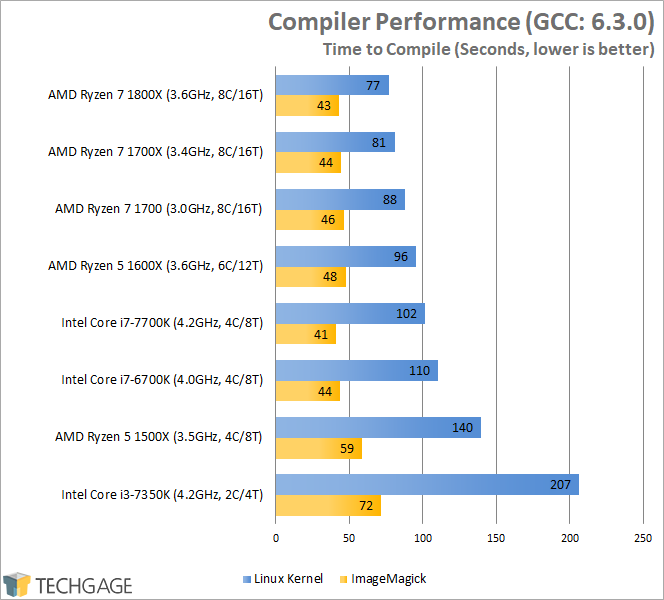
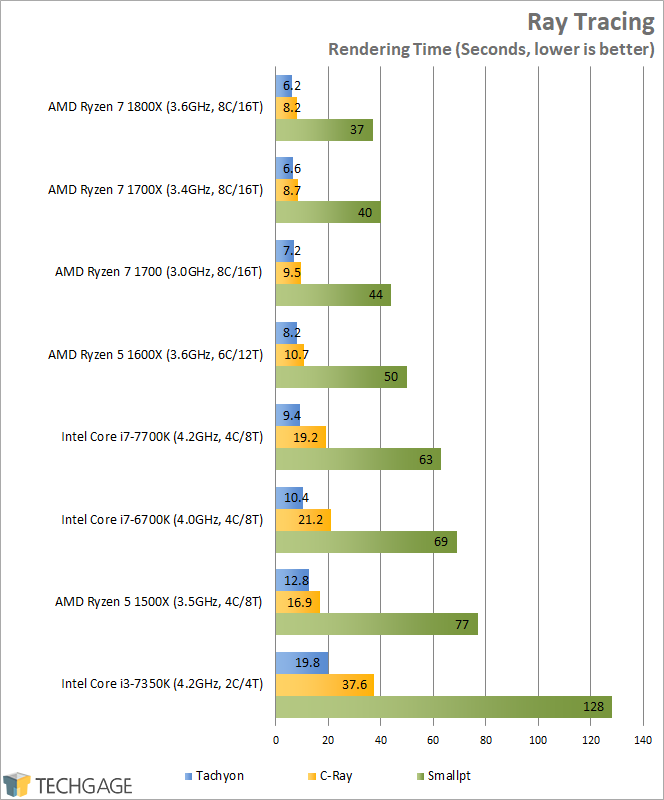
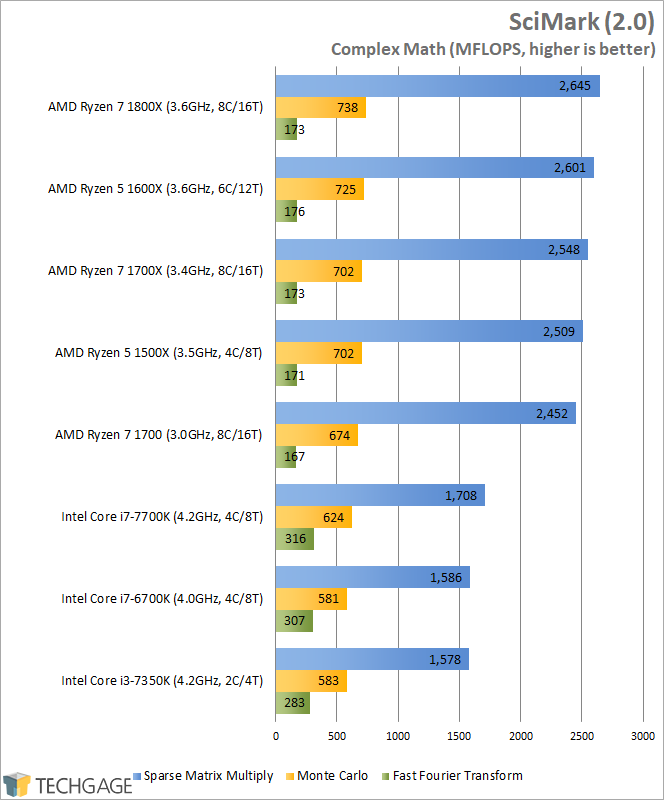
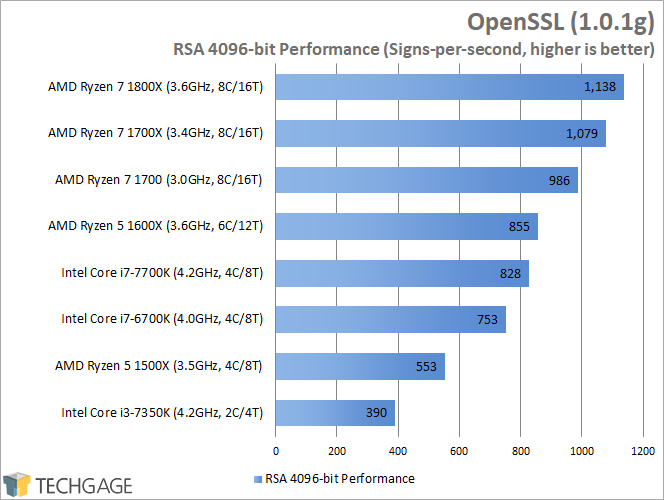
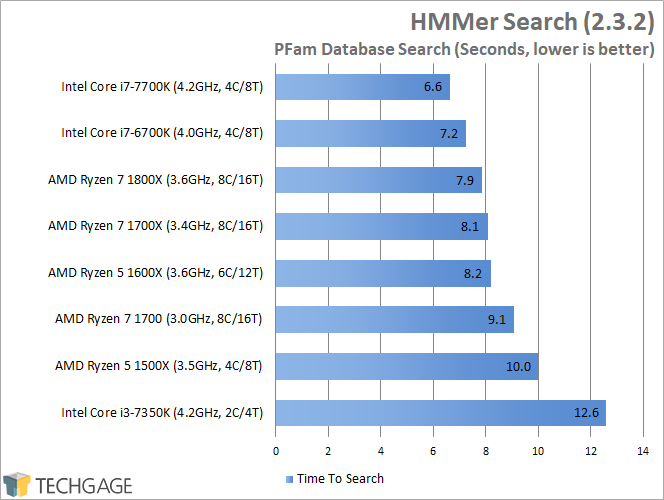
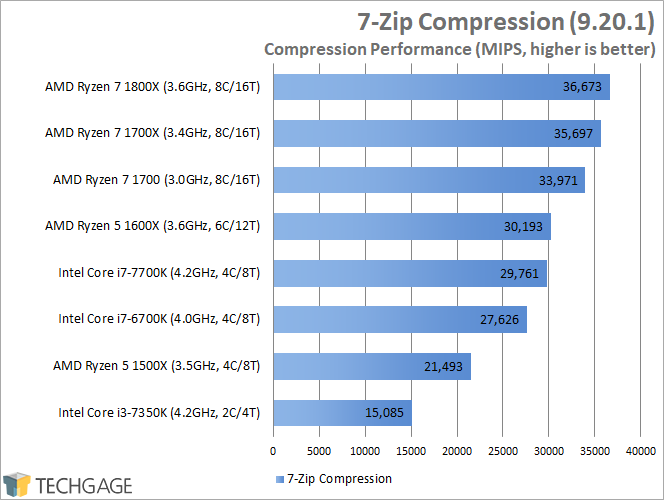
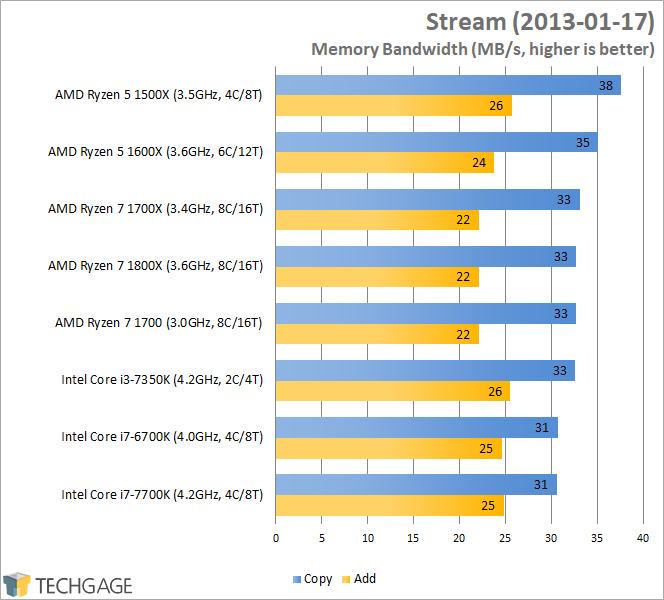
| John The Ripper (Encryption) | |||
| Blowfish | MD5 | DES | |
| AMD Ryzen 7 1800X | 12.8K | 200K | 44.6M |
| AMD Ryzen 7 1700X | 12.2K | 190.2K | 42.1M |
| AMD Ryzen 7 1700 | 11.1K | 168.6K | 38.3M |
| AMD Ryzen 7 1600X | 9.6K | 149.5K | 33.7M |
| AMD Ryzen 7 1500X | 6.3K | 97.1K | 21.9M |
| Intel Core i7-7700K | 9.0K | 109K | 22.0M |
| Intel Core i7-6700K | 8.2K | 99.5K | 20.1M |
| Intel Core i3-7350K | 4.3K | 52K | 10.4M |
Some of the results above make me glad to test with Linux, because we can see stories that are a little bit different from the ones we have with Windows. Check out the C-ray ray tracing benchmark, for example, which was almost twice as fast on the 1600X over the 7700K. The 1500X was more than twice as fast as the 7350K – but that’s at least to be expected given its doubled core count.
In SciMark, AMD’s Ryzen performs exceptionally well, dominating the Sparse Matrix Multiply test and outperforming all three of the Intel chips in Monte Carlo. FFT performance belongs to Intel, with the lowbie 7350K managing to beat out even the top-end Ryzen 7.
All of the other results paint a picture we’ve seen on previous pages: the 1600X is faster than the 7700K in many cases, and the 1500X is faster than the 7350K in all cases except for the Fast Fourier Transform calculations.
Support our efforts! With ad revenue at an all-time low for written websites, we're relying more than ever on reader support to help us continue putting so much effort into this type of content. You can support us by becoming a Patron, or by using our Amazon shopping affiliate links listed through our articles. Thanks for your support!





